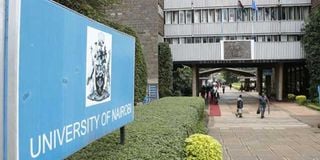Ministry pushes for radical reforms in universities

The Ministry of Education is advancing reforms that target income of public universities' staff. PHOTO | FILE | NATION MEDIA GROUP
What you need to know:
- For the last one year, the University sector suffered most after lecturers went on strike for 78 days demanding better terms of service.
- In 2014, the Commission for University Education gave universities five years to implement the rule requiring lecturers to have doctorates.
The Ministry of Education has proposed radical changes that will see public university councils empowered to determine their own individual terms and conditions of service for their staff.
The reforms are contained in a sessional paper dated December 2018 and titled Reforming Education and Training for Sustainable Development.
The document, which is before the National Assembly for debate, proposes the introduction payment of academic staff salaries based on the course they teach.
It similarly proposes “government-funded teaching assistantships in public and private universities for post-graduate students who would transit from undergraduate studies to attaining their PhDs and serve as teaching assistants,” the proposal reads.
PHD HOLDERS
National Assembly’s Education Committee chairman Julius Melly (MP, Tinderet) said they will discuss the sessional paper when they resume session in February.
Before then, Education Cabinet Secretary Amina Mohamed is expected to meet the committee on Thursday to discuss the document and other matters.
The policy observes that universities face several human resource challenges among them difficulty in attracting and retaining qualified staff, especially PhD holders, in all disciplines particularly those of national priority and necessary for the attainment of Vision 2030 and ensuring that universities portray a national outlook, including at top management level.
“One of the main challenges in the attraction and retention of staff...is the current approach to development and implementation of terms and conditions of service for academic members of staff,” the paper observes.
INCOME
It adds that remuneration scales (basic salaries and housing allowances) are established after negotiations between the department responsible for Education and Training with University Academic Staff Union (Uasu), and are subsequently applied uniformly across all disciplines and across all public universities.
The Ministry says that the problem with this approach is that universities are unable attract or retain adequate numbers of faculty members and those that can from their own incomes are prevented from doing so.
It adds that this has hindered university councils develop strategies to attract and retain staff.
For the last one year, the University sector suffered most after lecturers went on strike for 78 days demanding better terms of service.
POSTGRADUATE
In 2014, the Commission for University Education gave universities five years to implement the rule requiring lecturers to have doctorates.
Lecturers with master’s degrees were reduced to tutorial or junior research fellows, also known as teaching assistants.
A recent Kenya National Bureau of Statistics report indicates that there is a decline in postgraduate enrolment in public universities, which fell by more than a half last year.
It showed that 32,977 students registered to pursue master’s and PhD courses, down from 67,407 students in 2016, reflecting a drop of 51.07 percent.





